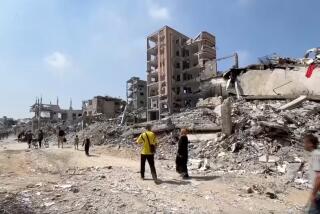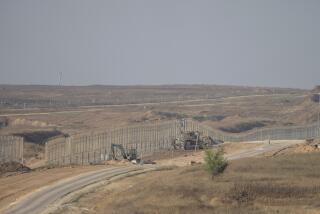Deadly assault exposes Iraq’s delicate state of security
- Share via
Reporting from Baghdad — Insurgents briefly raised the black flag of Al Qaeda in Iraq over a mostly Sunni neighborhood of Baghdad on Thursday during a brazen assault that killed 16 people and laid bare Iraq’s fragility as the withdrawal of U.S. troops accelerates and the country’s political crisis deepens.
Ten of the dead were from the security forces, four were members of the U.S.-allied Sunni militia Awakening, and two were civilians, according to the Ministry of Interior. In addition, at least 14 people were injured, and police said the casualty toll could rise as sporadic clashes between security forces and gunmen continued into the night.
The deaths of the seven soldiers and three policemen in Baghdad brought to 17 the total number of Iraqi security forces killed in incidents nationwide Thursday, underscoring the vulnerability of the security forces as U.S. troops are in the process of drawing down to a total of 50,000 by the end of August. Two Iraqi soldiers died in car bombings in Fallouja, four were killed in a suicide bombing north of Tikrit, and a policeman was shot dead in Mosul.
But it was the ferocious midafternoon battle in the former insurgent stronghold of Adhamiya in northern Baghdad that was most jarring for a city increasingly on edge as Iraq approaches its sixth month without a new government following nationwide elections in March that failed to produce a clear winner.
In scenes reminiscent of the worst years of the insurgency, when militants ruled supreme in the neighborhood, gunmen overran an army checkpoint on a busy street around 3 p.m., killing three soldiers and setting their bodies ablaze. Then, as police and army vehicles raced to the rescue, the assailants detonated five explosive devices in quick succession and pinned down the stricken forces with automatic weapons.
Shops closed, residents raced for home, and gunfire rattled through the deserted streets as the neighborhood seemed to be spiraling out of control. Police said about 35-40 insurgents were involved in the assault, operating in groups of four or five and hiding in surrounding houses. Some were wearing masks, but others were not, suggesting they had no fear of being recognized by locals.
As the battle raged, army and police officials said, the militants pulled down the Iraqi flag from the checkpoint and raised in its place the black banner of the insurgent group Al Qaeda in Iraq, recalling the time before the area was pacified by U.S. troops and members of the Awakening movement in the fall of 2007.
By nightfall, the security forces had sealed off the area, imposed a curfew and began carrying out widespread arrests, moving house to house detaining suspects amid sporadic bursts of gunfire.
“We are hiding in our houses,” said Abu Riyam, 44, a resident of the area speaking by telephone from his home. “We can hear gunfire and maybe mortars. We are afraid about what will happen next.”
Maj. Gen. Qassem Atta, spokesman for the Baghdad command, told Iraq’s Al Hurra TV station that “the situation is under control and the security forces are in control.”
But the ease with which insurgents appeared to overwhelm the army, albeit briefly, was a chilling reminder of the potential for an insurgent comeback as the political stalemate over the formation of a new government drags on. The country’s political factions have not even agreed which bloc should lead the government, leaving wide open the question of who will be the next prime minister.
Since the election, Prime Minister Nouri Maliki, a Shiite Islamist, and secular politician Iyad Allawi have each insisted that he should be the one to head the next government. Allawi’s Iraqiya coalition won the largest number of seats in parliament, with 91, compared with the Maliki bloc’s 89.
Meanwhile, officials say U.S. troops remain on track to complete their drawdown to 50,000 noncombat forces by Aug. 31. Visiting Baghdad this week to prod Iraqi leaders into speeding up their negotiations, U.S. Adm. Michael G. Mullen, the chairman of the Joint Chiefs of Staff, said he saw “absolutely nothing to negatively impact that.” All U.S. troops are scheduled to leave by the end of 2011.
U.S. officials say the drawdown will have little practical effect because Iraqi security forces have been responsible for most of the nation’s hotspots since U.S. troops withdrew from Iraq’s cities in June of last year.
Adhamiya has been under Iraqi army control for most of the last three years, and although it has been mostly calm, relations have long been strained between the mostly Shiite Muslim security forces and the mostly Sunni Muslim residents, who complain of discriminatory behavior by the soldiers.
Those sectarian tensions surfaced during Thursday’s battles. A policeman in Adhamiya who requested anonymity because he was not authorized to speak on the matter said some residents came onto the streets during the initial assault to applaud the gunmen as the bodies of the dead soldiers burned.
Another officer, who also spoke on condition of anonymity, said the security forces did not dare take their injured to the hospital for fear that Sunni doctors would not treat them well. Instead, the officer said, they took their injured to more distant facilities, and one policeman bled to death on the way.
Salman is a staff writer in The Times’ Baghdad Bureau. Times staff writer Usama Redha contributed to this report.
More to Read
Sign up for Essential California
The most important California stories and recommendations in your inbox every morning.
You may occasionally receive promotional content from the Los Angeles Times.













